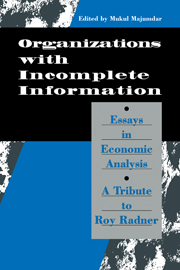Book contents
- Frontmatter
- Contents
- List of Contributors
- Preface
- Introduction: Searching for Paradigms
- 1 Equilibrium with Incomplete Markets in a Sequence Economy
- 2 The Existence of Rational Expectations Equilibrium: A Retrospective
- 3 Rational Expectations and Rational Learning
- 4 Dynamic Games in Organization Theory
- 5 The Equilibrium Existence Problem in General Markovian Games
- 6 A Practical Person's Guide to Mechanism Selection: Some Lessons from Experimental Economics
- 7 Organizations with an Endogenous Number of Information Processing Agents
- 8 A Modular Network Model of Bounded Rationality
- Index
Introduction: Searching for Paradigms
Published online by Cambridge University Press: 09 October 2009
- Frontmatter
- Contents
- List of Contributors
- Preface
- Introduction: Searching for Paradigms
- 1 Equilibrium with Incomplete Markets in a Sequence Economy
- 2 The Existence of Rational Expectations Equilibrium: A Retrospective
- 3 Rational Expectations and Rational Learning
- 4 Dynamic Games in Organization Theory
- 5 The Equilibrium Existence Problem in General Markovian Games
- 6 A Practical Person's Guide to Mechanism Selection: Some Lessons from Experimental Economics
- 7 Organizations with an Endogenous Number of Information Processing Agents
- 8 A Modular Network Model of Bounded Rationality
- Index
Summary
Introduction
Problems of decision making with incomplete information about all the “payoff relevant” variables have been posed and studied in depth from several angles. At one extreme are models that focus on an individual agent (e.g., the literature building on the “Savage paradigm”). At the other extreme – in the Walrasian tradition – are models that highlight the role of prices in coordinating independent decisions made by many agents. In between, there are models – in the Cournot tradition – with a small number of interacting agents, often with divergent interests. Problems of characterizing optimal decisions of individual agents, mutual consistency of such decisions in the larger context of an organization or an entire economy, and the possibility of achieving efficiency through appropriate design of organizations have been among the themes of enduring interest. Some of the essays in this collection review recent developments on several fronts while others stress the need for new directions.
Equilibrium
We begin with a review of a substantial literature on economic equilibrium under uncertainty. Chapters 1 and 2 are very much in the Walrasian tradition in the sense that the decision makers participate in markets and accept the terms of transactions as given. It has been pointed out that Walrasian equilibrium theory embodies a number of ideas. Such an equilibrium portrays a balance of the forces of supply and demand simultaneously in all the markets. Thus, the question of existence of an equilibrium was often reduced to the study of conditions under which a certain set of equations had a solution.
- Type
- Chapter
- Information
- Organization with Incomplete InformationEssays in Economic Analysis: A Tribute to Roy Radner, pp. 1 - 19Publisher: Cambridge University PressPrint publication year: 1998

